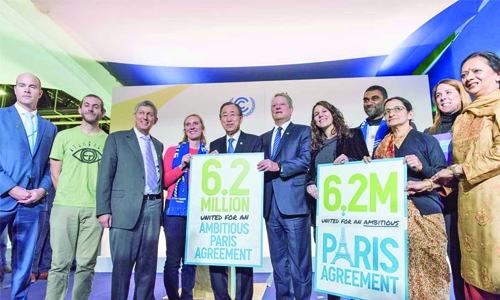Record number of signatures expected for Paris Agreement
A record number of countries are expected to sign the historic climate agreement adopted last December in Paris at a signing ceremony hosted by United Nations Secretary-General Ban Ki-moon today.
More than 130 countries have confirmed that they will sign the Agreement today, the first day that the agreement will be open for signature. This would surpass the previous record of 119 signatures for an opening day signing for an international agreement, set by the Law of the Sea in Montego Bay in 1982.
Paris Climate Change Agreement
In Paris, the 196 parties to the UN Framework Convention on Climate Change reached a historic agreement to combat climate change that will spur actions and investment towards a low-carbon, resilient and sustainable future.
The main aim is to keep a global temperature rise this century well below 2 degrees Celsius and to drive efforts to limit the temperature increase even further to 1.5 degrees Celsius above pre-industrial levels.
The agreement will enter into force 30 days after at least 55 countries, accounting for 55 per cent of global greenhouse gas emissions, deposit their instruments of ratification or acceptance with the Secretary-General.
To reach these ambitious and important goals, appropriate financial flows will be put in place, thus making stronger action by developing countries and the most vulnerable possible, in line with their own national objectives.
Significance
The Paris Agreement is an ambitious, dynamic and universal agreement, solidifying international cooperation for climate change.
The Agreement sends a powerful signal to markets that now is the time to invest in the low-emission economy. It will serve as an important tool in mobilising finance technological support and capacity building for developing countries. And it will also help to scale up global efforts to address and minimise loss and damage from climate change.
Countries have one year to sign the Agreement, following which they may ratify, accept or approve the Agreement. States that have not signed will still be able to join the Agreement by depositing an instrument of accession with the Secretary-General.
A country’s signature on the agreement initiates the critical domestic process, on which depends its final entry into force. This process takes many separate forms and can be rapid or lengthier, depending on each country’s domestic practices. The outcome may be countries’ instruments of ratification, acceptance, approval or accession.
Following each national completion of this process, instruments are submitted to the Depositary under the UN Secretary-General in New York. It is only once such an instrument is deposited that a country can be said to have ratified the Paris Agreement.
The fact that 188 countries representing close to 100 percent of global emissions submitted their Intended Nationally Determined Contributions shows very broad engagement in the process. It shows that countries see Paris as the first stop in a process and are fully engaged in getting where we need to go.
In 2018, countries will have an opportunity to review their collective effort against the global goals prior to formally submitting their national contributions to the new agreement. This exercise will be repeated every five years.
The Signing Ceremony
The Paris Agreement calls for the deal to be open for signature from 22 April, 2016 to 21 April, 2017. The signing event will take place at UN Headquarters in New York on the first day the agreement will be open for signature, which coincides with the observance of Earth Day.
Over 60 Heads of State and Government will attend the ceremony, demonstrating the continued high level of engagement by world leaders to accept and implement the Paris Agreement. The ceremony will also bring together leaders from civil society and the private sector to discuss efforts to boost financing for climate action and sustainable development.
Need of the hour
The world has warmed before, but never this quickly, and it is due to human activities. For instance, the changes in the Arctic between just six years ago and now are shocking.
Global temperature rise can be limited to less than 2 degrees if action is taken now. It is doable. Taking climate action now makes good economic sense. The more we delay, the more we pay. We can promote economic growth, eradicate extreme poverty, and improve people’s health and well-being by acting today.
“Paris was historic,” the Secretary-General said. “But it’s only the beginning. We must urgently accelerate our efforts to tackle climate change. I encourage all countries to sign the Paris Agreement on April 22 so we can turn aspirations into action.”
Related Posts

